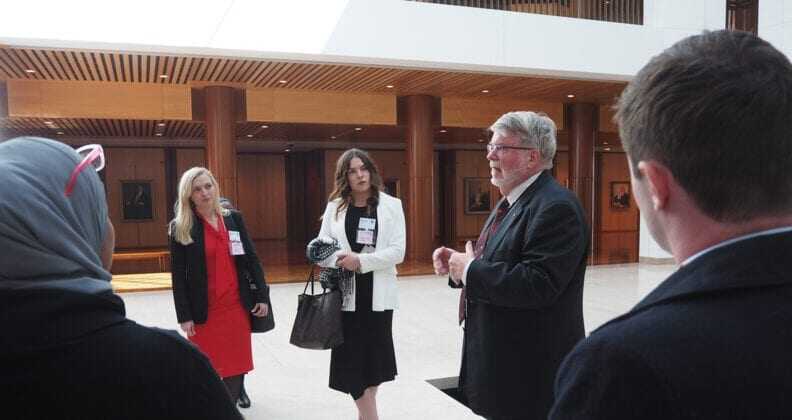Curtin Global Voices Scholarship recipients Rachael Ryan and Niamh Wilkins are advocating for positive change.


Having lived in Sydney during the summer of 2019–2020, Rachael Ryan saw how destructive bushfires could be to natural environments and the communities that live within them. The fire fronts were spread across the New South Wales coast, with the air quality consistently reaching poor or hazardous levels.
After the fires, the online Curtin Master of Sustainability and Climate Policy student was struck by one awful statistic: 10 times as many people had died from smoke pollution than in the fires themselves.
“People couldn’t get reprieve from the smoke because Australian houses are typically quite ‘leaky’. This needs to be addressed because catastrophic weather events that led to Black Summer will become more frequent, and climate impacts increase in severity,” Ryan explains.
Ryan is now using her platform as a recipient of a Curtin Global Voices Scholarship to better educate the public about the risk of bushfire smoke exposure and to make air purifiers more accessible for vulnerable Australians. She is writing a policy paper, which will be published in the Global Voices Journal and shared with state health departments, to promote positive change.


Rachael Ryan’s policy paper provides recommendations to minimise smoke exposure in households.
“I hope that this scholarship gives me a voice in the climate change space and helps me make a meaningful contribution to protect life. By building up our nation’s ability to plan and respond to climate events like prolonged smoke exposure, more people will be better protected from the associated health emergencies,” Ryan says.
Fellow scholarship recipient Bachelor of Laws and Bachelor of Commerce (Marketing) student Niamh Wilkins is advocating for increased access to technological resources and education for students in regional Western Australia. According to research by the Bankwest Curtin Economics Centre, more than 20% of households in 11 regional areas struggle to access the internet.
Wilkins previously assisted Aboriginal and Torres Strait Islanders as a Curtin Volunteers! member in Meekatharra, but became more aware of the internet access issues when she transitioned to online study during the first COVID-19 lockdown in 2020.
“The lockdown didn’t greatly affect me, but I became cognisant there were students in remote and regional Western Australia who would be having difficulty accessing online services, even outside of COVID, which would greatly impact their studies,” Wilkins says.
“This creates a problem for society because education fosters the leaders of tomorrow. Without access to education, we can’t have all our voices heard.”
Wilkins is now hoping to instigate discussions in these area by publishing her policy paper in the Global Voices Journal, and presenting it to educational leaders in the WA State Government.


Niamh Wilkins gained understanding from her own experiences studying online during the first COVID-19 lockdown (credit: Annabelle Fouchard, Curtin University).
Creating change from “outside of government”
As members of the national Global Voices Scholarships Program, the students have benefited from online meetings on their policy proposals and participating in a briefing program in Canberra, to further their knowledge of diplomacy.
Ryan has already met virtually with international dignitaries at the 74th World Health Assembly conference and Wilkins took part in the first of the OECD Forum Series for 2021. Both students have also had online meetings with Australian dignitaries including former prime minister, Kevin Rudd.
Global Voices CEO Jack Dalrymple says these opportunities highlight the need for more young people to be involved in policy-making.
“The World Health Organization and OECD are key multilateral institutions at the forefront of global discussion making – from vaccinating the world and the pandemic treaty to multilateral tax avoidance and reducing the digital divide. But young people are rarely given the opportunity to enter these spaces,” says Dalrymple.
“NIAMH AND RACHAEL’S DEDICATION AND LEADERSHIP HIGHLIGHTS THE UNIQUE CONTRIBUTION YOUNG PEOPLE CAN MAKE IN POLICY DISCUSSIONS, AND THE NEED TO INCLUDE YOUNG LEADERS IN DECISION-MAKING AND POLICY ACTION.”
Wilkins says the scholarship has offered a major insight into the inner workings of government decision-making.
“Global Voices shows you how to make a difference without being in government. It breaks down how to write a policy proposal, but it also lets you meet the leaders who will be acting on your proposal,” Wilkins explains.
“In the future, I hope that employers will see what I’ve tried to accomplish with Global Voices. I have a real interest in social justice issues and would ideally like to continue to take my career globally.”


Rachael Ryan and Niamh Wilkins (second row, left) with fellow Global Voices Scholars in Canberra (credit: Global Voices).



































